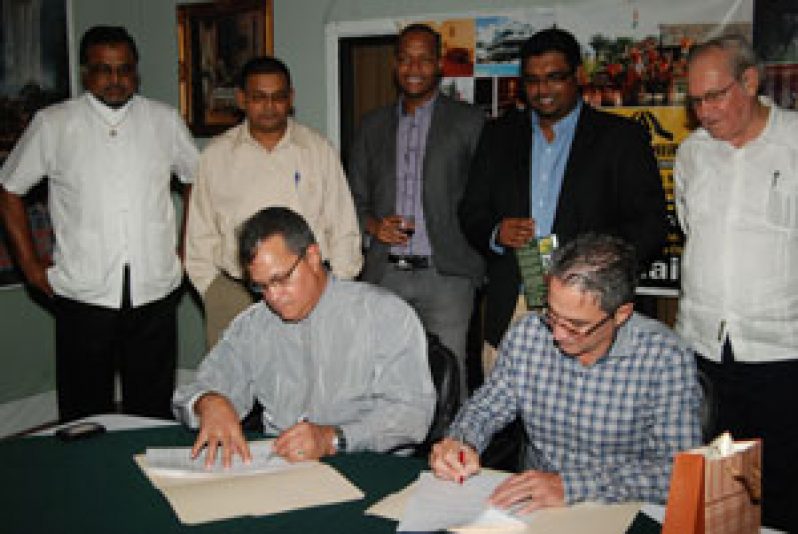GUYANA’s tourism has, for the last 20 years, been a vision in the making, and according to Chairman of the Roraima Group of Companies, Captain Gerry Gouveia, the industry has progressed from a time when the private sector was advocating, to a point where the government of the day seems not to be sleeping, but is in fact not championing the drive.
 Gouveia made this observation Thursday evening as he inked a Memorandum of Understanding (MoU) with Surinamese tour operator, Karel Dawson of the Kabalebo Nature Resort for a two-pronged approach to marketing, particularly eco-tourism, for the two countries in a joint package.
Gouveia made this observation Thursday evening as he inked a Memorandum of Understanding (MoU) with Surinamese tour operator, Karel Dawson of the Kabalebo Nature Resort for a two-pronged approach to marketing, particularly eco-tourism, for the two countries in a joint package.
Kabalebo Nature Resort is an eco-lodge located on the Kabalebo River in the western region of Suriname, approximately 150 miles from the nearest road or village. Described as an intriguing Amazon outpost, the Kabalebo Nature Resort is efficiently run and guided by descendants of the original Amerindian and African maroons.
Prior to the formal inking of the MoU, Captain Gouveia told the gathering at the Duke Lodge in Kingston that there was a time when the industry faced a government that did not believe in the “biodiversity of our rainforest.” Nonetheless, he said, the private sector slugged on for many years, to the point now where tourism is recognized as an integral tool for the economic development of Guyana.
He said that, today, each time the President speaks of Guyana, he speaks of tourism; and he added that there is an equally enthusiastic minister with responsibility for the sector who has also been challenging the private sector.
“We have come to a point in time in our country where we no longer have to convince government of (the value of) tourism,” Capt. Gouveia said.
| ‘We bring to the table what the rest of Caribbean can only imagine’ – Cpt. Gouveia |
Speaking to the joint venture between the two countries, Gouveia said it would still be an uphill challenge, given that marketing the product would require about US$1M.
This venture, he said, is unique in that “what we bring to the table is what the rest of the Caribbean can only imagine. We bring to the table a rich cultural diversity.”
He said that this is now finding itself being complemented by bringing the Dutch and English together in one package. “The Amerindians of Guyana and Maroons of Suriname in one package,” he said.
According to Gouveia, while the products may be similar, they are different and would serve to complement each other. He suggested that the combination would serve to sell the products “like never before.”
In his sales pitch regarding the Kabalebo Nature Resort that will serve as part of the package, Dawson said Guyana and Suriname have a lot in common, and the river dividing the two countries should not be seen as a river dividing, but as a bridge connecting them.
“You have an Amerindian culture, we have the Maroon culture. They will complement each other…. You have rich English, we have rich Dutch. Both of our companies coming together will complement each other,” Dawson said.
Chairman of the Private Sector Commission (PSC), Mr Ronald Webster, who was also on hand to witness the signing ceremony, lauded the two companies’ initiative, and reminded those present that in today’s world, nature tourism is serious business given the fact that most of the tourists gravitating to such tourism are usually more in a category of the upper class of society.
Wishing the two businessmen well in their undertaking, Webster said the PSC is fully supportive of the venture, and he said the venture partners have “our wish for a prosperous future.”
Tourism Minister Irfaan Ali, who also joined in on the auspicious occasion, said that from a Government perspective, he was happy to see the twinning of the two dynamic products, even as he congratulated Captain Gouveia for his “leadership in the sector.”
He said the Chairman of the Roraima Group of Companies was “on the ball” in his push to expand the industry, and he informed that he has also been in talks with his Surinamese counterpart on working out an effective co-marketing plan for the two countries.
The Minister disclosed that when the Caribbean island states had been approached in recent times to work out a joint package to twin the marketing of sand, sea and sun with eco-tourism, “they were skeptical,” but market changes are now dictating to them that tourists require a more versatile substance.
Tourists, he said, don’t just want sand and sea, as this can be found across the world. He pointed to the fact that eco-tourism is increasingly on the increase. “High-end tourists go to eco-resorts,” Minister Ali added as he posited that “they want to rekindle with nature; they want to rekindle with the natural beauty of the world.”
Minister Ali reminded that the local private sector has, in recent times, been aggressively seeking to gain the upper hand, and he said that some $32B have being invested in the industry by the private sector.
He said that, locally, “every single resort is improving and expanding.”
Speaking directly to the joint venture between Arrowpoint and the Kabalebo, Minister Ali said that Suriname is important to Guyana for a very good reason, given that that country has been capturing the European tourists.
He said that when Delta Airlines exited the Guyana market, there was a greater push to seek to target the European tourists who would have already been familiar with the Surinamese package.



.jpg)










